MercoPress. South Atlantic News Agency
Tag: Eurozone
-
Tuesday, December 17th 2013 - 02:53 UTC
Ireland exits bailout program but difficulties remain; Portugal next in the queue

Ireland's prime minister has marked the end of the country's bailout program with a speech to the nation. In a televised address, Enda Kenny said Ireland's “good name and our credibility” had been restored. Meanwhile Portugal could be the next in the list after a review of the economy was advanced six months.
-
Thursday, November 7th 2013 - 19:25 UTC
Euro zone lowers rate to prop economy and avoid deflation; shares at five-year high

A surprise rate cut by the European Central Bank sent Euro zone shares to a five-year high on Thursday as traders bet a weaker Euro and easier lending conditions would help revive the region's economy and boost demand for stocks.
-
Thursday, November 7th 2013 - 07:44 UTC
EU recession close to inflection point but unemployment remains at 'unacceptable levels'
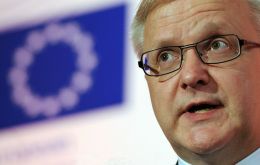
The Euro zone economy's gross domestic product will grow 1.1% in 2014 and 1.7% in 2015, with imbalances diminishing as unemployment remains at unacceptable levels, the European Commission said in a report released earlier this week.
-
Saturday, November 2nd 2013 - 15:55 UTC
Unemployment in Euro-zone remained at record high 12.2% in September
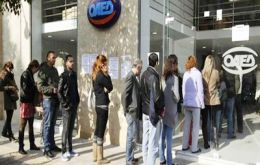
The unemployment rate in the 17-nation Euro-zone remained at a record high of 12.2% in September as the bloc’s recent recovery failed to generate new jobs, official data shows. The number rose by 60,000 to 19.45 million, while the jobless rate for those aged under 25 edged up to 24.1% from 24% in August, according to Eurostat, the European Union’s statistics agency.
-
Tuesday, October 8th 2013 - 18:32 UTC
IMF forecasts sluggish expansion in developing world; trims global output estimate
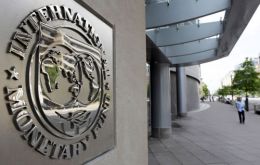
The International Monetary Fund trimmed its forecasts for global output for the sixth time since early last year, saying stronger growth in most advanced economies would fail to make up for a more sluggish expansion in the developing world
-
Thursday, September 26th 2013 - 21:36 UTC
Spain out of recession “but not out of the crisis”, Rajoy tells US financial media

President Mariano Rajoy making the round of financial media in New York this week, said Spain had emerged from recession in the third quarter with estimated economic growth of 0.1% to 0.2% forecast and 0.5% to 1% in 2014.
-
Wednesday, September 18th 2013 - 06:46 UTC
Controversial figure named to advisory board of the Euro-zone leading bank
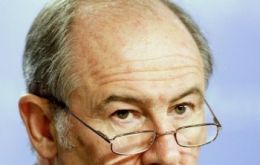
Santander, the Euro zone's biggest bank, has hired Rodrigo Rato, under investigation in connection with allegations of fraud at state-rescued lender Bankia when he was chairman, to its international advisory board.
-
Friday, September 6th 2013 - 00:39 UTC
ECB ready to cut rates or pump more money to help sustain Euro-zone recovery

The European Central Bank said it was ready to cut interest rates or pump more money into the Euro zone economy if necessary to bring money market rates down and help the Euro zone's economic recovery. ECB chief Mario Draghi said the policymaking Governing Council did discuss a possible rate cut at its monthly meeting, partly due to concern about money market rates and the uncertain “very green” nature of the recovery.
-
Wednesday, August 14th 2013 - 20:16 UTC
EU climbs out of 18-month recession led by Germany and France, but still fragile

European stock markets mostly rose on Wednesday after official data showed that the Euro zone had finally escaped from a record 18-month recession. The Euro-zone climbed out of recession with surprisingly strong growth of 0.3 percent in the second quarter led by Germany and France, announced the European Union.
-
Friday, August 2nd 2013 - 02:42 UTC
Euro rates to remain unchanged for extended period of time, says ECB
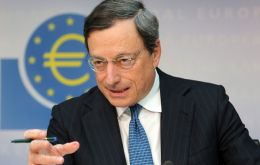
The European Central Bank left interest rates at a record low 0.5% on Thursday and said that they will remain there for some while to come and could yet fall further. ECB President Mario Draghi hinted that policy would not be tightened until well into next year at the earliest, although the central bank will give no time horizon for when rates might move.
